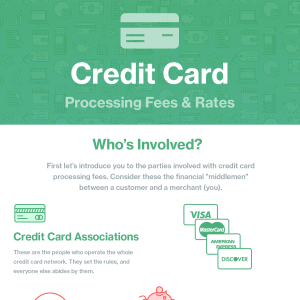Credit card refunds are simple for customers but can cost businesses lost processing fees. Here’s how they work and what they mean for you.
Our content reflects the editorial opinions of our experts. While our site makes money through
referral partnerships, we only partner with companies that meet our standards for quality, as outlined in our independent
rating and scoring system.
If you’re a merchant, it’s important to understand how credit card refunds work before creating your store’s refund policy. At a minimum, be prepared to lose the processing fees you paid on any returned payments.
The good news is that credit card refunds are usually straightforward … unless returns get excessive. This guide explains how refunds work, potential fees, and tips for handling them effectively.
What Is A Credit Card Refund?
A credit card refund is when a merchant sends money back to a customer’s card to return payment for a product or service that didn’t meet expectations. Here’s what else you need to know:
- Refunds usually go to the same card used for the purchase.
- Merchants can also offer store credit instead of a refund.
Refunds VS Chargebacks: What’s The Difference?
Chargebacks and refunds are not the same thing.
The difference comes down to who issues the refund:
- Credit card refunds: The customer requests a refund directly from your business. You can approve or deny it based on your policy.
- Chargebacks: The customer goes to their bank or card issuer to dispute a payment. The bank refunds the customer directly and often charges the merchant a fee (around $15 per chargeback).
Too many chargebacks can lead to account holds, freezes, or even getting listed on the MATCH list, which makes future merchant accounts harder to get.
How Do Credit Card Refunds Work?
Think of refunds as payment processing in reverse:
- The merchant issues a full or partial refund through POS, virtual terminal, or card machine.
- The customer’s account is credited (usually within five business days).
- Any rewards, cashback, or promotional credits from the original purchase are reversed.
For eCommerce merchants, marketplaces may dictate how refunds are handled. Otherwise, use your processor’s dashboard, POS, or card swiper.
How Long Does A Refund Take?
Most refunds are complete within seven business days. However, some banks or card issuers may take 30+ business days to process refunds.
Popular processors like Square and PayPal typically process refunds in five business days.
Do Credit Card Refunds Have Fees?
Most processors don’t charge an extra fee, but they don’t return the original processing fees either.
For example, if you paid $2.50 in processing fees on a $100 transaction, that $2.50 is lost even after the refund. Customers receive the full amount of their purchase (minus any shipping or restocking fees). So even if there aren’t any extra fees, refunds typically aren’t “free” for merchants.
How To Create A Refund Policy
A clear refund policy keeps returns simple, prevents confusion, and helps reduce chargebacks.
Consider including:
- How long customers have to return an item
- What qualifies for a full refund, partial refund, exchange, or store credit
- Whether opened packages get partial credit
- Costs for repackaging or restocking
- Who pays return shipping
- Any restocking fees
Display your policy in-store, on receipts, on your website, and with shipments.
Can You Avoid Credit Card Refund Fees?
Most processors don’t return original transaction fees, so completely avoiding costs is rare.
However, some processors do refund transaction fees, which is worth exploring if your business handles a lot of returns (like apparel or footwear).
The Bottom Line On Credit Card Refunds
Credit card refunds are usually simple to process and shouldn’t have a big impact on your business. The main thing to remember is that you’ll likely lose the original processing fees, even though your customer gets their full payment back.
The best way to minimize the hassle is to set a clear refund policy, understand what costs you’re responsible for, and, if possible, choose a payment processor with low fees or refund-friendly terms. With a little planning, you can handle refunds smoothly while keeping both your business and your customers satisfied.











